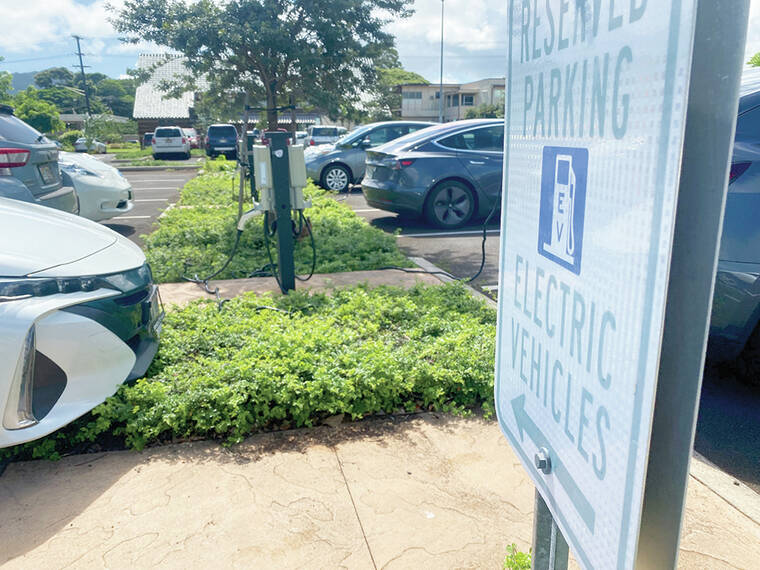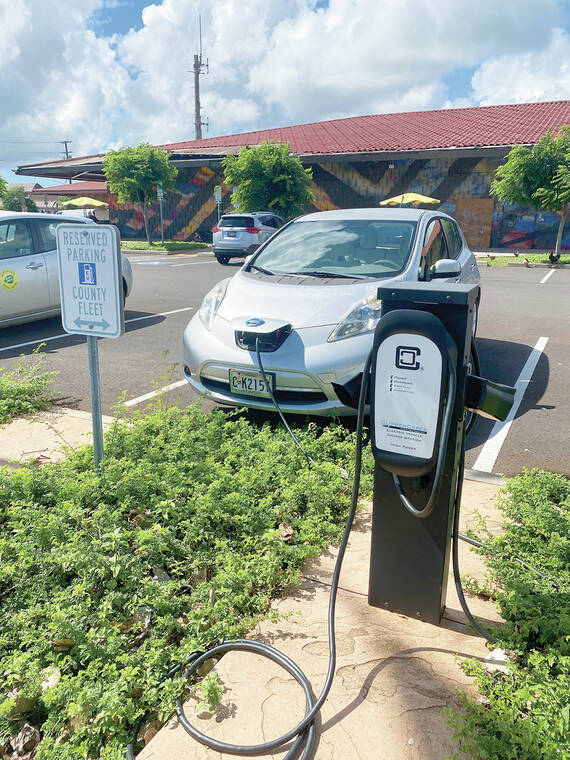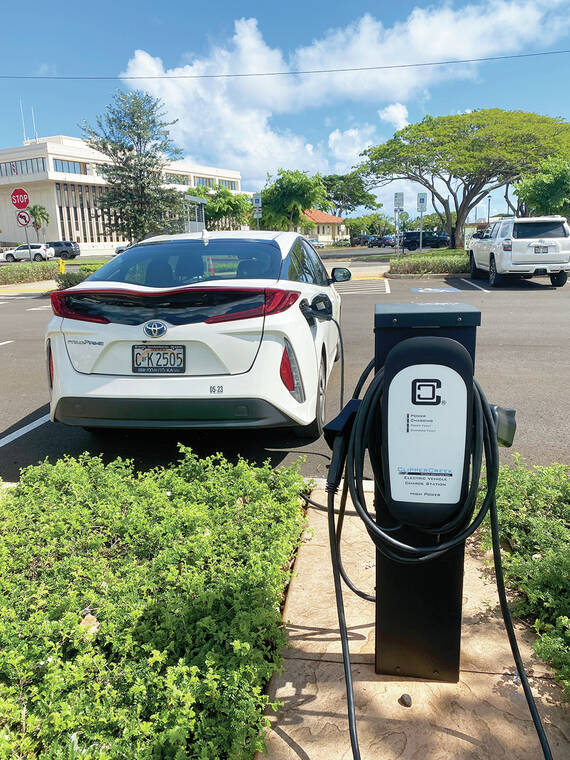LIHU‘E — As electric cars become more common on local roads, the Kaua‘i County Council is taking a step to get more charging infrastructure in place to accommodate them.
In a 5-2 vote Wednesday, the council agreed to pass Bill No. 2877, which requires that new parking lots with more than 100 spaces install EV charging systems in 5 percent of their stalls.
Introduced by council members KipuKai Kuali‘i and Luke Evslin, the measure would also require all new parking lots, regardless of size, have EV-ready infrastructure in place in 15 percent of the spaces.
“The market isn’t there yet, but we know without a doubt it’s going to be there,” said Evslin, citing laws in several states requiring all cars to be electric in the near future.
“Lack of charging is going to be a persistent issue in the future. The problem with just waiting to let people install them at their will in the future is that the charge of ripping up an existing parking lot is going to be five times the cost per stall.”
Violators of the new law could possibly face hefty fines of up to $10,000 a day, at the discretion of the county Planning Department.
While most homes can charge an electric vehicle, many hotels, resorts and apartments still lack that infrastructure, according to Daniel Erickson of electric car rental company Mission Zero Hawai‘i.
“There are tons of chargers in Lihu‘e, but in Kapa‘a there’s really not all that many,” said Erickson. “And there are tons of resorts there. From our standpoint, if every resort had one it would reduce the hassle of trying to charge your rental car.”
Erickson said this number had been growing since 2017, from about 20 chargers to more than 70 island-wide.
A BloombergNEF study projects the global electric vehicle market size and adoption will grow in the long run. By 2025, electric vehicles are projected to hit 10 percent of global sales, growing to 28 percent in 2030 and 58 percent by 2040.
“It’s inevitable that people are going to be buying electric cars as people realize they’re cheaper to operate, cheaper to maintain,” said Erickson. “There’s going to be a major shift starting in 2023.”
Due to high battery costs, electric cars tend to be more expensive than traditional vehicles — $18,000 more expensive on average this July, according to Kelley Blue Book. Even when accounting for the money saved on fuel and maintenance costs (estimated at between $6,000 and $10,000 over the lifespan of the car), it is still more expensive than conventional vehicles.
But these numbers are being brought down by tax breaks. The federal government aimed to incentivize the use of electric cars by expanding a $7,500 tax credit on the purchase of electric vehicles through the Inflation Reduction Act earlier this year.
The two votes in opposition to Bill No. 2877 came from council members Billy DeCosta and Felicia Cowden.
Inspired by testimony from frequent county council attendee Lonnie Sykos, DeCosta advocated for an incentive for businesses to install chargers rather than a penalty for those who fail to do so.
Cowden said she valued the intention of the bill, but warned of “unintended consequences,” and joined DeCosta in support for an incentive-based solution instead. The introducers expressed frustration that these concerns had not been mentioned at the bill’s committee discussions, to which Cowden responded she hadn’t brought them up because she felt “thoroughly bullied” in discussions on other bills that day.
The bill will now go before Mayor Derek Kawakami for final approval.
•••
Guthrie Scrimgeour, reporter, can be reached at 808-647-0329 or gscrimgeour@thegardenisland.com.







It is important that the charging systems be powered by renewable energy such as solar, or we’re still using fossil fuel to run our vehicles.
Not even criminals convicted of serious crimes are fined $10,000, much less {or more really) at $10,000 per day. Giving county workers, Planning Dept personnel, the power and authority to fine a person or business monies great enough to take their home away is more akin to the oligarchy of Russia or the Communist Party of China, and
Not our American Democracy. County Planning Dept. workers are not Courtroom Judges.
Further no matter what measures could be taken by our county, that is the population numbers of our island including visitors, would never amount to more than a can of beans in comparison to the cities of the world with populations of 1 to 20 million people and their unregulated cars and trucks.
Add to that the industrial polluters, the coal burning and diesel burning electric plants, the 20,000 jet airplanes polluting the atmosphere 24 hours a day, and worst of all the poison chemicals used on farms and plantations, and on massive corporate farms, toxic chemicals in every packaged food, and the chemicals in every medication and Rx prescription drug.
I’m rethinking my vote this year to only Felicia Cowden, Billy Dacosta, and Fern Holland.
Too many people in political and government jobs lack a global perspective. Who are these people who want more and more laws without thinking long term impact.
Who invented an empty KAUAI bus system on an hourly schedule when privately owned jeepney / vans could serve us every 15 minutes. How many would gladly take a van and leave their car to get around the island thus reducing vehicle pollution.
But wait, these proposed charging stations, is it diesel fuel burning that will make the electricity?
Give us and visitors Public Transportation with 15 minute service, and to more locations and destinations, that will lower pollution and money wasted on fuel in private vehicles.
“It’s inevitable that people are going to be buying electric cars as people realize they’re cheaper to operate, cheaper to maintain,” said Erickson. Until the battery goes, that is……..
“Due to high battery costs, electric cars tend to be more expensive than traditional vehicles — $18,000 more expensive on average this July, according to Kelley Blue Book. Even when accounting for the money saved on fuel and maintenance costs (estimated at between $6,000 and $10,000 over the lifespan of the car), it is still more expensive than conventional vehicles.”
No one see the irony here? Another industry that cannot survive on merits but subsidy.
Anyone care to research how much raw earth materials are used to make one battery? ~50 tons. How much energy (think fossil fuel) does it take to extract, refine and produce the final product?
Anyone care to research what happens when batteries no longer work? Where do they go? Are they safe to put in a dump? Do they ever break down? How long do they even last?
Yes going green is a noble and worthy pursuit. But do your homework. Be practical. All this will do is marginalize the locals who cannot afford the new expensive batteries. The world cannot run on this technology without some sort of fossil fuel powering it’s charging station…
Incentives. If one grocery store, for instance, has chargers and the other doesn’t the consumer might decide to shop at the charged parking lot.